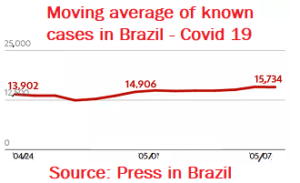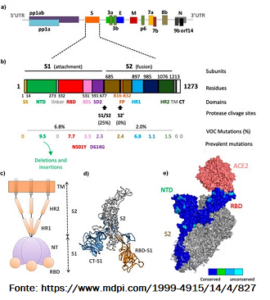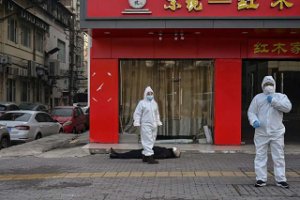
Arquivo para a ‘Economia’ Categoria
Covid 19 rising trend in Brazil
In numbers Publisher by the Brazilian Ministry of Health itself, ranging from May 4th to 5th, Saturday and Sunday in general there is underreporting, the epidemiological bulletin has already recorded a high of around 8.9% with 21,682 new infections and 137 deaths from the disease. .
ranging from May 4th to 5th, Saturday and Sunday in general there is underreporting, the epidemiological bulletin has already recorded a high of around 8.9% with 21,682 new infections and 137 deaths from the disease. .
This trend has continued since the beginning of the month and reaching the rate of 15% will be considered a new high and a new wave, although the number of deaths is lower and a moving average remains below 100 daily deaths, being average and having number above 100 could rise again, as the average number of infections is higher and the number of deaths is lower because the strain is less lethal than the previous ones.
The calculation of moving averages is done by experts using the records of the last 14 days and dividing the total by 14, it is possible to have a broader view of the current moment of Covid.
There is no clear analysis of this slight increase, perhaps a seasonal effect of the arrival of the cold that favors respiratory infections, but this would be very premature because it is happening in the southern hemisphere in less than a week, perhaps the greater capacity of infections of the second omicron lineage, BA.2, the worrying thing is that it favors the circulation of the virus and the danger of new variants.
Except for specialized sectors that alert to the issue, little attention is paid to the most accurate information about this future of SARS-Covid, only the situation in China that remains serious and now even with reports of inhumanities due to an excessive and strict #lockdown.
In Brazil it is electoral period and this does not favor correct information about Covid.
Study reveals danger in new variants
The world number of deaths from Covid 19 decreases, but with resistance to say that the variants can be less lethal and make the number fall to zero, while the health crisis hits China’s largest cities hard, including now the capital Beijing, without a clear diagnosis.
with resistance to say that the variants can be less lethal and make the number fall to zero, while the health crisis hits China’s largest cities hard, including now the capital Beijing, without a clear diagnosis.
In Brazil, the falling number now seems to stabilize with small increases, at times it exceeds 100 daily deaths of the moving average, reaching 200 and the number of infections does not fall, reaching close to 20 thousand cases, which is the scenario future?
A Brazilian study, carried out by researchers from USP-Brazil at the Institute of Biomedical Sciences (ICB) and the Institute of Chemistry (IQ) as well as researchers from the Hospital Sírio-Libanês do Brasil, reveals that the new variants of SARS-COV-2 are more likely to circumvent the population’s immune defenses and should emerge in the coming months.
The work was published by the journal Viruses and reviews more than 150 articles, investigated the immune system’s evasion capacity, transmissibility and effectiveness with vaccination in addition to the mutation potential and the result serves as a warning.
The article reads verbatim “Growing evidence has shown that mutations are being selected in favor of variants that are more capable of evading the action of neutralizing antibodies” and shows that the authorities’ lack of concern with the pandemic is political.
In terms of protocols, individual concerns follow, there is no clear public policy
Reason, Belief and War 2
The relationship of science and belief in Bourdieu’s lesson: “The paradoxical enterprise that consists in using a position of authority to speak with authority, to teach a lesson, but a lesson of freedom … would be simply inconsequential, or even self-destructive , if the very ambition to make a science of belief did not presuppose belief in science” (Bourdieu, 1994, p. 62), can be better expressed by the principle of transdisciplinarity.
enterprise that consists in using a position of authority to speak with authority, to teach a lesson, but a lesson of freedom … would be simply inconsequential, or even self-destructive , if the very ambition to make a science of belief did not presuppose belief in science” (Bourdieu, 1994, p. 62), can be better expressed by the principle of transdisciplinarity.
Establishes the Arrábida Transdisciplinarity Charter in one of its principles: “Considering that the contemporary rupture between an increasingly cumulative knowledge and an increasingly impoverished inner being leads to the rise of a new obscurantism, whose consequences, at the individual and social level, are incalculable”. (Freitas, Morin and Barsarab, 1994)
The idea of science based on calculus (including economics) or the physics that makes it possible to advance in the mystery of the infinite universe, with wormholes, black holes and dark matter, cannot do without the mystery that is beyond what man has already conquered.
On the political side, the belief in the modern state that would replace God and could establish perpetual peace (Kant’s philosophical project) as well as science as the summit of “reason” has already shown its limits, as has the fundamentalist faith, which already was with the Pharisees in the time of life, land of Jesus, has limits of ignoring science, even wanting a science of belief, the paradox presented by Bourdieu.
Neither Kant’s perpetual peace nor advanced scientific studies made it possible to avoid war and the world is once again on the verge of a new humanitarian catastrophe, and it is also worth noting that religious fundamentalism cannot abolish it like the “Decalogue of Assisi for Peace” signed in Assisi on March 4, 2002, although they still defend it today.
The Pharisees wanted Jesus to be involved in the war against Rome, which will take place in the 70s of the Christian d.C., with the destruction of Jerusalem and its Holy Temple as predicted in the prophecies, not because Jesus wanted it, but because of the war that men wished.
After the Jewish Passover, and the Passion and Resurrection of Jesus which was our Passover, Jesus appears to the disciples and the apostle who did not believe Thomas was with them, the first greeting of Jesus is: “Peace be with you” (Mt 20, 21), breathes the Holy Spirit on them and told Thomas that he wanted material proofs of his resurrection: “Put your finger here and look at my hands. Reach out your hand and place it in my side. And do not disbelieve, but be faithful” (Mt 20,27) and happy will say those who believe without having seen.
Kant, I. (2008) Perpetual Peace: A Philosophical Project. trans. Arthur Mourao. Ed. University of Beira Interior. Portugal: Covilhã.
Freitas, L., Nicolescu, B. and Morin, E. (1994)Letter of Transdisciplinarity. Convent of Arrábida.
Crab Footsteps and War
Umberto Eco’s book: “A Passo de Caraguejo: Hot Wars and  Media Populism” (first Portuguese edition of 2012) is from more than a decade ago, but very current, Eco died on February 19, 2016, but if he were alive he would have had a lot to say. because his vision is prophetic.
Media Populism” (first Portuguese edition of 2012) is from more than a decade ago, but very current, Eco died on February 19, 2016, but if he were alive he would have had a lot to say. because his vision is prophetic.
He spoke of the global regression, this is the step of the crab, the resurgence of creationism, the iPod radio (now in disuse), he saw the rebirth of nations not as an affirmative period of cultural identities, but “after the fall of the Berlin Wall, the political geography of Europe and Asia changed radically, making it clear that we were moving backwards. Atlas editors saw forces … to draw inspiration from the old pre-1914 models, like their Serbia, their Montenegro, their Baltics States and so on” (Eco, 2022).
He also saw the rebirth of creationism and so many other absurd worldviews in a process of going backwards like “the steps of the crab”, and when we least expect the war and the new models of expansionism and colonization, and he already warned of media populism, today more evident.
However, in a deeper vision, Max Weber already pointed at the beginning of the last century “the disenchantment of the world”, forced to an excessively rational vision, where he saw the social model: “not what weighs on individuals, but what is transmitted between them”. ”, so what seems outside the objective world, the world of ideas is the one that is transmitted among men.
Pierre Bourdieu returns to “disenchantment” (Bourdieu, 1979) to analyze the assumptions of the Enlightenment and of Kant as a starting point for these ideas, the idea that is in scientific knowledge, consolidated by the French Revolution and its models of state that combined with the technique, would provide a drastic change in human lifestyle, bringing lasting peace.
However, in addition to the ignored colonial wars, two world wars were also triggered, and the bad agreements at the end of each one of them led to others, which delineates now is a repetition of errors, where the reason of each state wants to prevail over the other. , and soulless (and disenchanted) rationalism shows us a world of horror, hatred and intolerance.
Bourdieu warned that the mechanism of direct democracy should not become an element of symbolic oppression, and that most of the words we have for the social are between euphemism and insult, it is like wanting to perpetuate the current state of segregation and oppression.
Bourdieu, P. (1979). O desencantamento do mundo: as estruturas econômicas e estruturas temporais. Trad. Silvia Mazza, Brazil, São Paulo: Editora perspectiva.
Eco, U. (2022) O passo do caranguejo: guerras quentes e populismo midiático. Trad. Sérgio Mauro. Brazil, São Paulo: Record.
Weber, M. (2004) A ética protestante e o “espírito” do capitalismo. Trad. José Marcos M. de Macedo. Brazil, São Paulo: Companhia das Letras.
Covid moving average drops, but variant already appears
According to data from FioCruz in March, the genomes of covid cases evaluated in patients infected with the BA.2 mutation (second lineage of the omicron) grew from 1.1% in February to 3.4% in March, it is 63% more transmissible and in Europe and the East it is already dominant.
cases evaluated in patients infected with the BA.2 mutation (second lineage of the omicron) grew from 1.1% in February to 3.4% in March, it is 63% more transmissible and in Europe and the East it is already dominant.
The moving average of both infections and deaths has been falling (see the table to the side) but there is nothing in Brazil other than monitoring, the testing policy does not exist and the protocols are already relaxed, to complicate the cold and the carnival outside of time that favors agglomerations.
The cold favors lung diseases and consequently the Covid that causes infections of this type is favored, in addition to other respiratory diseases typical of this season, the flu vaccination campaign is still in slow motion.
The federal government says it does monitoring, the state ones don’t even that, the discussion about whether to release it or not is now irrelevant, since the population, at its own risk, has already relaxed preventive measures and carnival parties, completely out of season, will take place, private or public.
What remains for us is special private care and the hope that the vaccination rate in the country, which is quite high, will definitely stop the advance of Covid 19, amid other supply and price crises that are already quite worrying on the horizon.
So it stays on everyone’s conscience, since it’s not just the individual problem, the pandemic taught us that it’s everyone’s problem, someone who doesn’t take care infects someone close.
Now the horrors of war
The retreat from Kiev, far from being peaceful and moving towards a ceasefire, seems to have put more fuel in a war that is gradually returning to the horrors and barbarism of the 2nd. World War.
a ceasefire, seems to have put more fuel in a war that is gradually returning to the horrors and barbarism of the 2nd. World War.
The photos and facts of Butcha, one of the districts around Kiev reveals scenes of civilian deaths with cruelty and genocide, leaders from all over Europe have already spoken out, and the President of Ukraine Zelensky himself went to check the mass and civilian graves on the spot. dead with their hands tied, in addition to reported cases of rape.
While international agencies speak of 280 bodies, Ukraine claims to have found 410 civilian bodies, either in mass graves or abandoned on the streets, many with their hands tied, while Russia denies these atrocities, Kremlin spokesman Dmitry Peskov said there were “video spoofing”, however did not present any evidence to prove it.
Accusations of biolaboratories in Ukraine follow, also without evidence, if true they are also reprehensible, but they do not serve to justify the brutal death of civilians that leaves the war on another level, where agreements are more difficult and distant.
There is a new world order, or at least an attempt to implement it, the economic and political poles have shifted and a serious economic and food crisis is approaching, how to face it ?
It will be necessary to review values, if barbarism does not awaken our hopes it becomes more difficult, the pandemic itself should have already alerted us to a new wave of solidarity and concern, it is not just a virus, but attitudes that would be expected from leaders and the population, how many small wars still exist without opening to dialogue.
If we find this war and the pandemic horrifying, more horrendous are the attitudes of indifference and neglect, even the twisted ones that organize themselves or that despise the misfortune that occurs next door.
May the horrors of war at least serve to awaken a sincere humanism, concern and responsibility for the Other, mutual respect and dialogue, or we are heading towards an even worse reality which we have done nothing to try to avoid, or we have done little.
Peace, peace and hope, is the cry of those who look with love for humanity and for the Other.
The pandemic is not over
In addition to the State of São Paulo, seven other states are already abolishing the use of masks: Rio de Janeiro, Santa Catarina, Mato Grosso do Sul, Maranhão, Mato Grosso, Goiás and now Minas Gerais, some states are already preparing Samba schools for Carnival, in the middle of Christian Lent.
abolishing the use of masks: Rio de Janeiro, Santa Catarina, Mato Grosso do Sul, Maranhão, Mato Grosso, Goiás and now Minas Gerais, some states are already preparing Samba schools for Carnival, in the middle of Christian Lent.
Although the rate of spread of the coronavirus in Brazil is no longer so intense, the rates are not so low and experts consider that the measure may have undesirable impacts on the control of the disease in Brazil, but the mask must go up from the mouth to the eyes to have Carnival.
In addition to the world authorities of the WHO, such as technician leader Maria van Kerkhove, also the brazilian pulmonologist Margareth Dalcolmo, a prominent name of FioCruz in the face of covid-19 considers the measure somewhat hasty and warns of the dangers.
Authorities monitor the Deltacron variant in Europe, which is a variant between Delta and Omicron, countries like Denmark, France and the Netherlands and the WHO already monitors the variant.
A region of China of 9 million inhabitants, where the city of Changchun is (photo), ordered this Friday (11) strict confinement, with the emergence of an outbreak of the variant of the omicron, there there is discipline and control of the Pandemic.
Changchun is the capital of Jilin Province, which borders North Korea, and is therefore also close to South Korea and countries outside China.
As political authorities are less cautious than in previous periods, it now depends on local attitudes and public and private managers so that the signal passed to the general public does not prosper, the idea that the Pandemic is over sends the wrong message.
Even the numbers that were controlled by the municipal health departments seem to have already relaxed and in many places they have become unreliable, without data there is no right policy.
In addition to sending the wrong message to the public, it needs to be clear that the circulation of any one variant can lead to others and there is no guarantee that the variants will be less lethal.
New: By the end of last night, the industrial city region of Shenzhen also went into lockdown reaching a total of 40 million people.
Covid: slight drop in deaths and protocols
After several highs and stability in the number of deaths, this weekend saw the first drop in “known cases” as data providers say, as there is no testing policy (in Brazil), so the numbers of infections have also been falling, but for lack of data they are less reliable.
weekend saw the first drop in “known cases” as data providers say, as there is no testing policy (in Brazil), so the numbers of infections have also been falling, but for lack of data they are less reliable.
Vaccination of children and the total number in Brazil the country is also advancing, exceeding 80%, with a significant number of booster doses (30%), but protocols continue to be poorly managed: distancing, crowding and correct use of masks cannot be abandoned. and the next measure announced will be the release of masks in “outdoor” environments.
The number of 722 deaths per day is still high, after all they are deaths and not complicated cases or just unvaccinated people, a phase of well-administered protocols would be reasonable to make this number drop quickly and just go to any event and see that there is no more real concern, and in a political year this is not an accepted measure, for example in commerce.
Long-term Covid is not yet clinically understood and the medical recommendation is to always test, it affects children in a special way (uol’s website “viva bem” cites several cases in Brazil) and it is not present in the concerns of public environments, only masks and alcohol gel is the basic thing, there should be testing, in addition to the protocols that should be observed and are not (distancing, for example, is no longer observed in any public environment and there is no supervision).
It is expected that they will stick to the protocols in Brazil and that the moving average of deaths may drop faster than it has been so far.
Tomorrow we will talk about a second scourge of war, as we said at the beginning of the month, plagues, follow or precede wars and then hunger and social chaos will come, it is incredible that someone hopes or desires for a situation of such inhumanity, tomorrow let us return to the topic with the hope that the announced Russia-Ukraine dialogue will bear fruit.
Everyday Forces for Peace
Just as we can cultivate, from our thoughts, in words and deeds, different attitudes that we bring to our daily lives for peace or for its absence, we can understand that not only meditation, prayer or invocation of the presence of someone superior can to bring the world closer or farther from peace, are attitudes that spring from the heart.
different attitudes that we bring to our daily lives for peace or for its absence, we can understand that not only meditation, prayer or invocation of the presence of someone superior can to bring the world closer or farther from peace, are attitudes that spring from the heart.
Thomas Aquinas established that faith is a supplement to reason, believing and having hope mean an attitude of faith in a better future, in times of pandemic and its consequences can be more difficult positive attitudes if we think only individually, but if we understand that it is a social problem and it is up to everyone to collaborate and deepen bonds of solidarity and mutual help, so that we can walk and evolve towards peace.
The difficulty in understanding these values is because we focus on our little world around us, instead of listening to broader voices that cry out for Peace and solidarity all over the world, it is also necessary to give a voice to those who are close and ask for greater collaboration, As the Bible warns Lk 4:24: “I tell you the truth, no prophet is welcomed in his own country”, everyone thinks because he is an ordinary person that his words are worth little or that they should not be taken very seriously, according to this In this passage, right after reading the passage from Isaiah in which Jesus confirms his mission (to set the captives free, to give sight to the blind and to proclaim the Good News to the poor) the people of his city Nazareth said: “Is not this the son of Joseph? “, so could the common people not spread and spread the good news and herald peace.
It is from the ambitions of power and influence that the powerful increase conflicts and extend their networks, they do not bring greater solidarity or wisdom, they bring a confusion of ideas and the profusion of division within the social bosom in situations of conflict and misunderstanding.
Peace needs a pause of solidarity, the recognition that even being in a lesser condition of strength, it also has its right to a healthy life and social peace.
War is always a contradiction of what is just and good for everyone, it is thus a one-sided view of the truth that in general ignores the desire and thought of the simple person.
Covid Brazil: Pressured health system and increase
The increase recorded in the first weeks of January in Brazil in Covid cases, with a predominance of the ômicron variant, is very high and there is no tendency to stabilize, the health system is pressured by the increase in hospitalizations and the presence of the H3N2 flu that has also appeared , it’s usually only expected at the beginning of winter around April and May, but this year it came earlier.
cases, with a predominance of the ômicron variant, is very high and there is no tendency to stabilize, the health system is pressured by the increase in hospitalizations and the presence of the H3N2 flu that has also appeared , it’s usually only expected at the beginning of winter around April and May, but this year it came earlier.
The numbers are uncertain, but there is a significant increase (see graph), there is little testing and a crash in the Ministry of Health data that drags on for more than a month, this jeopardizes the adoption of policy and the effective control of the pandemic, as explained to the press the infectologist and researcher at Fiocruz: “We cannot plan the opening of new hospital services, testing centers, opening of new beds and understand the regions where the impact of the new variant is greater” and the numbers are expected to increase in February.
It is a fact that the infection of this variant is less serious, but it is not certain that this would be an indication of the end of the pandemic and care should be maintained, the end-of-year parties and the release of public events, there is already some setback in these measures. , were vectors of propagation of the variant that is more infectious than the previous ones.
Brazilian neuroscientist Miguel Nicolelis denied that the ômicron variant could be the end of the pandemic, stressing that mutations are probabilistically chaotic and it is not possible to predict the next variant or some point of linear weakening of the virus, it is likely that we will still have to live with it. for a long time, and the neuroscientist warns what is already happening in England and the United States where the health system can collapse at any moment, once it is under pressure. and warns that it is possible to reach a point of chronic Covid, this is a state in which the hospital system can no longer handle the volume of cases that happen and with palliative treatments only without being able to effectively treat the disease.
With this weekend’s numbers in Brazil, it reached close to 50,000 daily cases, the expectation is to grow until the end of February and the already pressured health system could collapse, while the authorities monitor without really data. valid and reliable data from the pandemic.
Vaccination of children began in Brazil, at the age of 5 to 11 years, with the Comirnaty vaccine (Pfizer/BioNTech) but the number of doses available is uncertain, the health secretariats have opened registration for scheduling that, in addition to avoiding agglomerations, can do a forecast as doses are available

